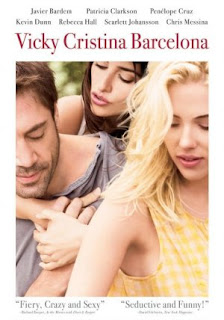 It’s fitting that the last comedy that I saw before this was Women on the Verge of a Nervous Breakdown, as this felt like Woody Allen spent a weekend going through his Viva Pedro box set and then sat down to write a film(among the tone and characters, see also the guitar scene). Allen should take notes from Almodóvar more often, if this was in fact the case, because the result is the funniest Allen film that I have seen. The close second, Annie Hall, made me laugh more in retrospect than during (though I have only seen it once). Most of this is thanks to Penelope Cruz. Cruz was unfortunately absent inWomen on the Verge, but her character here makes up for it (she might as well have stumbled out of the development pages of that film and wandered, drunkenly, in Woody’s subconscious). There is not a moment that she is in the frame, clinically and cynically unhinged by love’s consequences, that I wasn’t staring at her, smiling. But, like every good film that Allen has made, the laughs are secondary, and his misanthropic sentiments toward love and sex take precedence.
It’s fitting that the last comedy that I saw before this was Women on the Verge of a Nervous Breakdown, as this felt like Woody Allen spent a weekend going through his Viva Pedro box set and then sat down to write a film(among the tone and characters, see also the guitar scene). Allen should take notes from Almodóvar more often, if this was in fact the case, because the result is the funniest Allen film that I have seen. The close second, Annie Hall, made me laugh more in retrospect than during (though I have only seen it once). Most of this is thanks to Penelope Cruz. Cruz was unfortunately absent inWomen on the Verge, but her character here makes up for it (she might as well have stumbled out of the development pages of that film and wandered, drunkenly, in Woody’s subconscious). There is not a moment that she is in the frame, clinically and cynically unhinged by love’s consequences, that I wasn’t staring at her, smiling. But, like every good film that Allen has made, the laughs are secondary, and his misanthropic sentiments toward love and sex take precedence.
While Cruz’s Maria Elena is the glowing madwoman who makes this film such a beautiful farce, the most interesting character in the film is arguably Scarlet Johanson’s Cristina. Cristina comes off as hopelessly naive, but refreshingly impulsive, and her presence is often missed as much as, if not more than, Maria Elena’s is during the scenes with Vicky juggling her doofus fiancée and neurotic parents, easily the weaker sections of the film. Cristina enters and exits relationships on whims, and is in blunt contrast to Vicky’s commitment hell. When Cristina announces that she wants out of the menage e trois with Maria Elena and Juan Antonio, it refreshing because it feels like a such a simple and honest decisionIt is strange how satisfying it feels to see these characters making decisions that I want them to make. It’s a completely, viscerally rewarding viewing because Allen identifies urges that are innately inevitable and condemns the conventions that hold us back from happiness.
The film has a plasticky feel, in the warm and vivid colors and the ‘this-has-to-have-been-DNRed’ lack of grain in the image, to the slightly stilted line-deliveries by Johanson, Berdem, and Hall, to that pesky voiceover that has given so many viewers reservations about the film. It’s silly to complain, in this circumstance, that the voiceover is telling people what is happening instead of showing it visually, because the guy narrating is so hammy and blatantly ironic. The whores on the back alleys of Oviedo are clean and friendly, and the streets are immaculate. Allen is holding up bunny ears to the heads of traditional rom-coms and Spanish soap operas alike, sending Americans a Spanish postcard; crisp and glossy, worn edges and crumpled corners.
